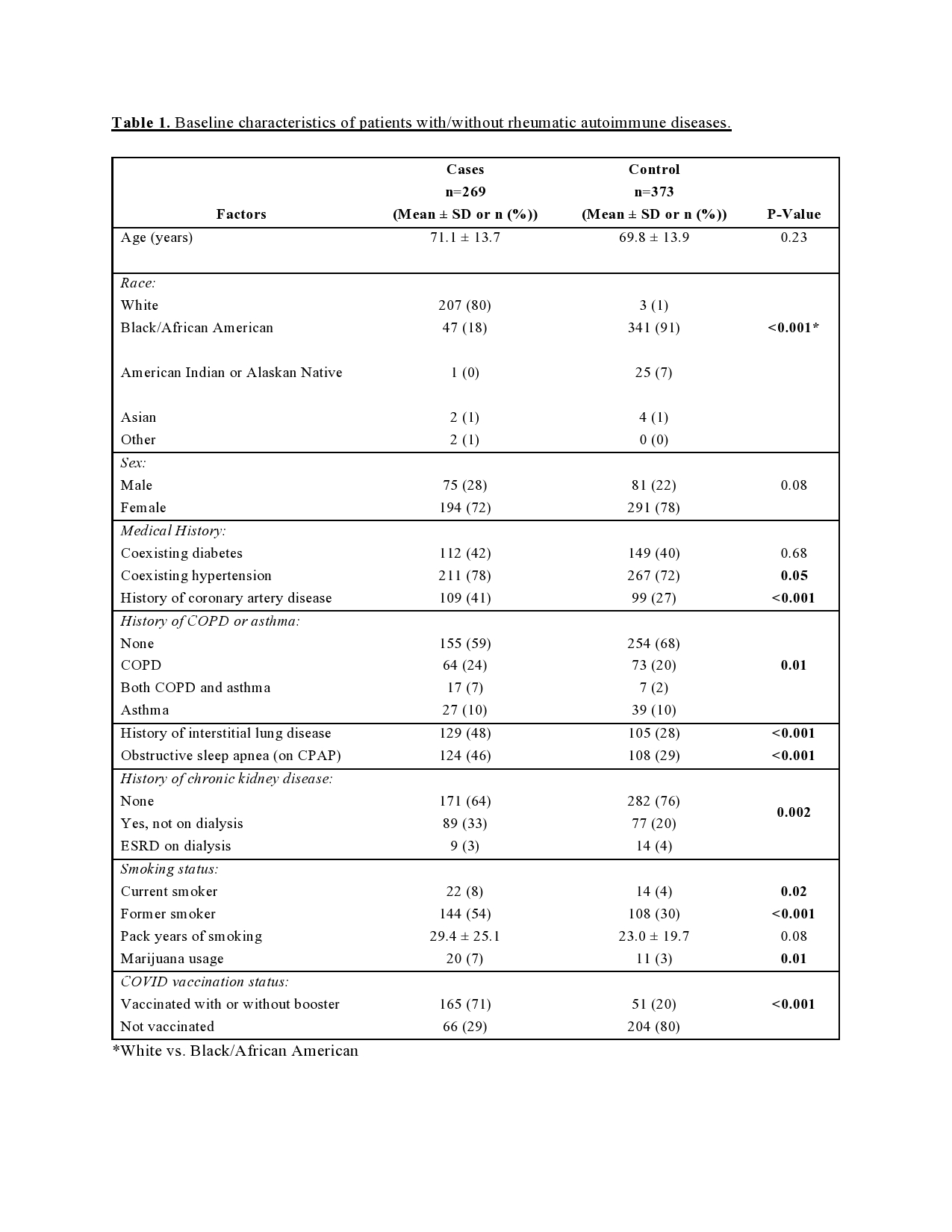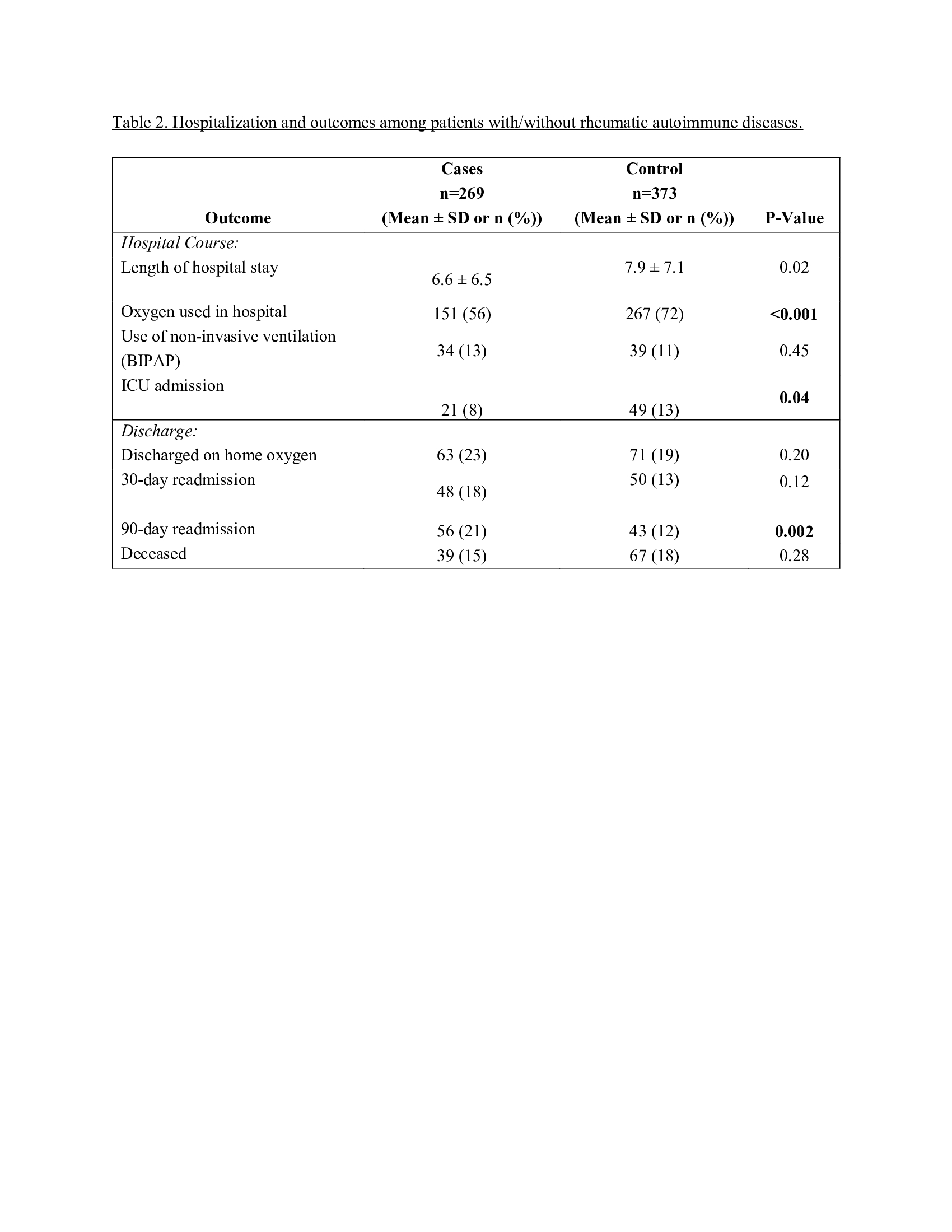Session Information
Session Type: Poster Session A
Session Time: 10:30AM-12:30PM
Background/Purpose: COVID-19 has brought challenges for people with rheumatic diseases as well as those faced by the general population, such as increased risk of SARS-CoV-2 infection and poor COVID-19 outcomes. COVID-19 infection brings additional challenges for those with rheumatic diseases like increased susceptibility, challenges with vaccination, suspected poor outcomes. We investigated the outcome of COVID-19 infections in hospitalized patients with underlying rheumatological diseases to observe if there has any change in the trends and outcomes.
Methods: This is an IRB approved, retrospective, multicenter case-control study at five different hospitals of Southeast Michigan, United States. Patients with underlying rheumatologic disease diagnosis with admitted diagnosis of COVID-19 infection were matched on age, sex and race with patients without rheumatologic diseases (controls). Data was obtained from electronic health records. Baseline characteristics, comorbidities, outcomes including intensive unit level care and readmissions were evaluated. Statistical analyses using SPSS version 26 was performed. With descriptve analysis continuous variables were described as mean with standard deviation while categorical variables with frequency distributions. Analysis of factors associated with group were assessed using student’s t-test and the chi-squared analysis.
Results: Between December 2019 to June 2023, n=269 rheumatic patients and n=373 healthy controls with admitting diagnosis of COVID 19 infection by positive PCR test were included in the study. There was no statistically significant difference between the mean ages of rheumatoid disease patients and controls (71.1 ± 13.7 vs. 69.8 ± 13.9 years respectively, p=0.227), with 72% of cases and 78% controls as females. Among the cases, rheumatoid arthritis was most prevalent at 75%, systemic lupus erythematosus at about 16% and 9% were other rheumatological diseases. Patients classified as cases were more likely to be vaccinated as compared to controls (p< 0.001). Among comorbidities, coronary artery disease with interstitial disease and asthma/COPD were more prevalent in cases with p< 0.001, and p=0.007 respectively. Fatigue and fever were more significantly reported among those with rheumatological diseases (p< 0.001, p=0.04 respectively). Interestingly, steroids with Remdesivir were more commonly used for COVID-19 treatment amongst those with rheumatic diseases, whereas Hydroxychloroquine was used more commonly in the control groups. There was no significant difference in mortality amongst the two groups; however, those with underlying rheumatic diseases had a higher 90-day readmission rate (p=0.002).
Conclusion: Our data suggests that for patients with rheumatic disease the risk for poor COVID-19 outcomes seems to be lower than previously estimated probably due to exposure to less virulent strains of SARS-CoV-2 over time, effective vaccines, and changes in management and the fact that these patients receive immune modulating medications, which have the potential to treat the underlying COVID-19 infection and improve their prognosis. The main limitation of the study is that we did not take into account treatment changes over time.
To cite this abstract in AMA style:
Zulfiqar F, Steele M, Santhi S, Singh B, Brar J, Raut S, Nakarmi P, Reddy S, Ayomide O, Roumia B, Tareen F, Crook N, Drust V, Mohamed A, Jani A, Orejuela J, Captain S, Vojalla N, Bilal M, Fatima R, Kesireddy S, Misner P, Prabhu R, Arsene C, Bilal J, Duong J. Comparative Analysis and Outcomes of COVID 19: Unveiling Trends in Rheumatological vs. Non-Rheumatological Disease Patients [abstract]. Arthritis Rheumatol. 2024; 76 (suppl 9). https://acrabstracts.org/abstract/comparative-analysis-and-outcomes-of-covid-19-unveiling-trends-in-rheumatological-vs-non-rheumatological-disease-patients/. Accessed .« Back to ACR Convergence 2024
ACR Meeting Abstracts - https://acrabstracts.org/abstract/comparative-analysis-and-outcomes-of-covid-19-unveiling-trends-in-rheumatological-vs-non-rheumatological-disease-patients/


